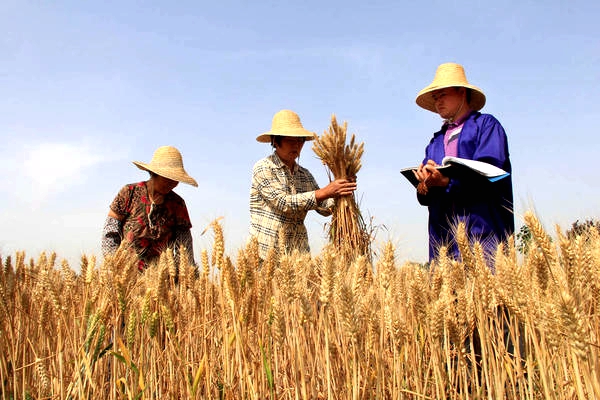Project Overview
The project FcIMCS aims to provide a holistic approach to dealing with sustainable fertiliser management by developing a farmer-centred interoperable mobile-cloud system that offers access, collection, aggregation and analysis of multi-source (lifelogging daily farming activities and environmental information) to support timely delivery guideline and recommendation in fertilisation practices.
FcIMCS will explore the integration and fusion of new data sources from existing products and services including mobile personal activity monitor at Sheffield University, data visual analytic kits from Ant Data Ltd, professional farmer training scheme from Velcourt Ltd.

d
The nature of the problem
The widespread use of fertiliser has greatly contributed to the huge increase in food and feed production worldwide during the last six decades. However, the extensive use of fertilisers has contributed to soil acidification, pollution of aquifers and increased emissions of ammonia (NH3) and greenhouse gases (notably N20, CO2, and CH4) to the atmosphere in China and globally. Sustainable fertiliser management for reducing farming emissions is an important agriculture activity that will help the global industry to reach the goal of “Net Zero Emissions”. With decades-long efforts to ensure the availability and affordability of fertilizers, China has built a massive fertilizer industry with a total annual production (53.1 Tg NPK) exceeding domestic consumption (48.9 Tg). The artificially low-priced fertilizers contributed to a national wide trend of fertilizer overuse, which results in China as the largest carbon emitter in the world, with responsible to over 25% of global agriculture production emissions. In the Paris Agreement, China has made a commitment to reduce its carbon dioxide emission intensity (per unit GDP) by 40 to 50% compared with the 2005 level by 2020.
There is an urgent and rising demand for technological innovation within the fertilizer management sector for enhanced production efficiency and environmental sustainability in China. Moreover, China is among the leading countries for wheat pest control due to urbanisation and technological growth in agriculture. This has led to higher standards of living among consumers, resulting in the rise in demand for improving wheat production wth sustainable fertiliser services. While Chinese government has recently commenced strong support for innovating a variety of novel smart farming technologies, their practical effectiveness and economic benefits are strongly limited by low education level and geographic dispersion of the majority of farmers in China. Thus, there still lacks of farmer-centred approaches to timely delivery of science-based fertilizer management products or services for improved nutrient use efficiency and reduced over application of nutrients.
Innovation

Unlike traditional field-oriented fertiliser monitoring and management systems that merely concentrate on monitoring and analysing environmental data for fertiliser advice, FcIMCS will aim at an innovative farmer-oriented fertiliser management approach integrating data from farming activities and environmental information, for delivering an interoperable mobile-cloud system to support sustainable fertiliser management. The system includes:
- Mobile terminals for monitoring daily farming activities and receiving science-based fertiliser recommendation;
- Data fusion and visualisation algorithms to support effective data fusion from multiple resources;
- Mobile-cloud platform that integrates data sensing, fusion and analysis for wide decision marking;
- Specialised training scheme to master the operation and use of mobile-cloud platform for SFM.
The key scientific innovations are from the mobile terminals and data fusion and visualisation algorithms. The mobile terminals will rely on accurate and robust mobile personal activity tracking technique from Sheffield University. This technique has been used in Active 10 with 650K users in three years. The data aggregation and visualisation algorithms will rely on a multi-modal data visual analytic kit (AntV) from ADL, where it already contains over 20 data fusion algorithms. The key commercial innovation is from the specialised training scheme from deliverable the mobile-cloud platform and the training scheme, which will open a new business routine for UK companies in delivering a full close pipeline of mobile-cloud fertiliser management systems including infrastructure, software, data service and training.
Project Plan
The project team coordinates the expertise of three UK partners: Ant Data Ltd (ADL), Velcourt Ltd (VEL) and the University of Sheffield (SU); and three China partners: Hefei Institutes of Physical Science (Institute of Intelligent Machines), CAS (CAS-IIM), Anhui Zhongke Intelligent Sensing Technology Ltd (ZK-IS), and Hebi Jiaduoke Industrial Service Ltd (HBJD).

There are several work packages which are designed to collectively achieve the project objectives. Each WP will deal with a specific aspect and potential outcome for the project. The general aim of this project is to build a farmer-oriented interoperable mobile-cloud system to support efficient and effective sustainable fertiliser management in China. The outcome of this research will be evaluated through joint experiments with the end users, leading to conclusions of the impact of mobile smart farming technologies on future agriculture in China.
Project Management is concerned with the co-ordination of project activities, assessment and evaluation of the overall performance of the project; delivery and assurance of final products; monitoring of resource use; management and allocation of budget, coordinating the external image of the project and liaison with key stakeholders, addressing and resolving issues related to IPR, conflict management and resolution as well as management of the relationship with the Innovate UK. The management framework will link all project components and maintain communication with the Innovate UK, ensuring that the project fulfils its goals through the successful completion of its individual WPs and tasks.
In order to explore and disseminate the results of this project, we will inform all internal and external stakeholders about the project results and the implications that these results might have for the industrial and research users, also we will communicate the availability of the technology to potential users and to import the technology into suitable application domains.
The project website will be continually updated during the project and will serve as the first point of information for the research community on the objectives, approaches and results of this project. The material will be regularly updated throughout the project and the latest version will always be accessible to partners on a private part of the website. These generic dissemination resources will be complemented by materials aimed at specific dissemination targets related to research, agriculture practice and industrial applications. By the end of the project, we expect to have a dissemination portfolio that can address issues relevant to all key stakeholders worldwide. All partners will help to select events and channels through which the project will be disseminated and will contribute to a Dissemination Plan.
Marketing
The targeted customers will include large-scale farmers, middle-size growers, agricultural cooperative enterprises, and individual farmers. The business model of this project will take the business-to-business approach, which sells the system software and services of delivered mobile cloud systems to large-scale farmers, middle-size growers, and agricultural cooperative enterprises. We will take cloud-based software distribution approach that hosts our fertiliser management applications and services to customers via the internet. The customers can access the software using a Web browser or a mobile device. Also, we will provide the personal training services to these business customers.

We will seek for synergies and joint potential between exploitation opportunities. For academic partners, the technical developments will be integrated quickly into their teaching curricula and research agendas, giving themselves and their graduates a competitive edge. The academic exploitation of strategic guidelines naturally has a longer time horizon. We will prepare the future research agenda, based on the results achieved by this project, and identify new problems which have to be solved to strengthen the impact further. We will also be tasked with preparing the workforce for the future landscape, both for direct work in industry and for research. The long-term result of the efforts of the academic partners will be to place the approaches developed in the mainstream of teaching and research in networking and communications systems.
The exploitation goals of the industrial partners are different yet complementary to those of academic partners. In fact, led by IME, the industrial partners are expected to play a main role in the exploitation. They will mainly focus their exploitation activities on improving their current operations and business position in existing markets and on the creation of, and preparation for, new markets, with the intention of securing a strong leadership position in them. This can be done by creating new products and services to improve their existing products for existing or currently incipient markets.
Meet members of the consortium
The synergy of the consortium ensures that developments within the project are directly applicable to the agricultural end user.